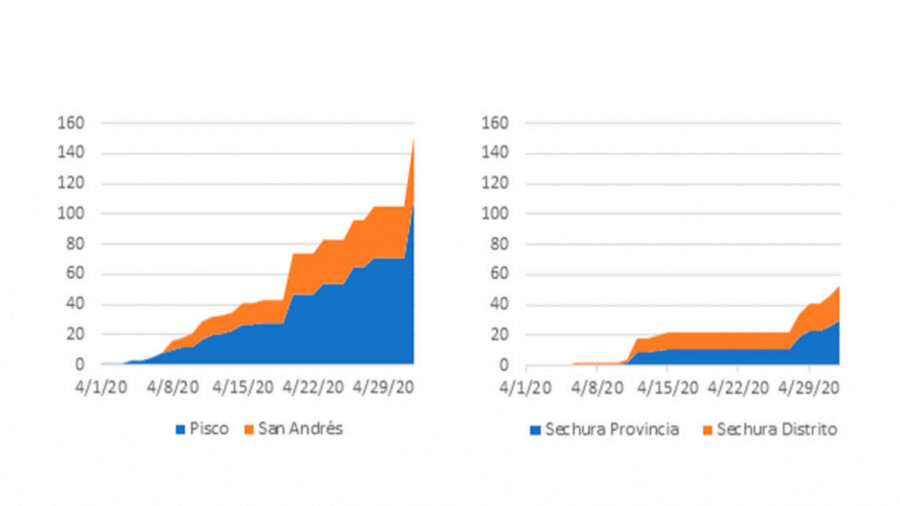Health crisis and small-scale fishing: infrastructure, outbreaks and vectors

By: Isabel E. Gonzales. Source: Grade Website
Although artisanal fisheries continued their activities during the quarantine, the pandemic crisis has impacted the sector. A series of recent infections in transporters and traders has paralyzed the activity. This has led to the economic precariousness of its workers and increased the risk of contamination. In this article, we review the problem and provide urgent measures to control the spread.
Because of their key role in food supply, artisanal fisheries and their related activities were exempted from the compulsory immobilization imposed by the State of Emergency following COVID-19. Despite this, the health crisis has had a negative impact on the sector. During April, infections were detected in users of several unloading and marketing infrastructures. This has not only led to the paralysis of the activity and the consequent economic precariousness of the fishing workers, but also increased the risk of contamination among the inhabitants of the fishing coves.
A representative case is that of DPA José Olaya Balandra in the district of San Andrés, the main landing and collection center for Pisco and the supply point for the Villa María del Triunfo and Ventanilla Fishing Terminals in Lima. At the beginning of April, four middlemen from San Andrés tested positive for COVID-19. According to the count of the cases, the infections were reported in the Villa María del Triunfo Fishing Terminal. It is worth noting that, a month after this episode, San Andrés has the highest number of infections in the province: 41 cases out of a total of 111.
As a preventive measure, four DPAs in Pisco5 were closed for the whole month of April; six DPAs6 in Arequipa frequented by traders from San Andrés were closed for a week; and the Villa María Terminal was closed for fifteen days for the disinfection of infrastructure and the implementation of protocols for the prevention of COVID-19. As a result, the supply of hydrobiological resources to the city of Lima was interrupted for two weeks, but even after the service was restarted, the volumes of sales have not recovered.
Supply of hydrobiological resources in the Wholesale Market of Villa María del Triunfo (kg/day, April 2018-2020). Source: PRODUCE7.Own elaboration.
In Pisco, the necessary closure of the DPAs, accompanied by operations to prevent unloading in areas that are not allowed, has paralyzed the activity of thousands of fishermen, longshoremen, marketers, transporters and processors, who have not been receiving income for a month. In Sechura, where the DPAs are still operating, but the health services have demonstrated their precariousness, the fishermen have voluntarily suspended their work to avoid contamination. Although DPA José Olaya is awaiting its next reopening, a sector of the population is opposed to it for fear that it will become a focus of infection.
At the beginning of April, SANIPES published a guide detailing the measures to be implemented in the fishing infrastructure to prevent the spread of COVID-19. However, the guide does not consider clear actions with respect to the transport units, whose agents have greater mobility and are the point of contact between fishing towns and areas of agglomeration such as the fishing terminals. It is necessary that the DPAs have measures that guarantee the sanitary conditions of their users, this is more urgent in remote areas where access is complicated and health services are precarious or non-existent.
Sanitary conditions in and between transport units should be regulated and contact between traders and transporters should be moderated. This requires that control measures be extended beyond the margins of the fishing infrastructure and static trade agents. It is recommended, for example:
Establish strict distance measures between chambers and restrict the movement of traders and transporters both inside the DPAs and Fishing Terminals, and in the parking lots and surroundings where commercial activity usually spreads.
Control the temperature of transporters and merchants when entering the DPAs and fishing terminals.
Carry out COVID-19 screening campaigns aimed at traders and transporters in the DPAs and fishing terminals. This should include not only resident merchants but also visitors who could be carriers.
Promote the use of bank transfers per application for transactions between merchants/transporter and merchants in the wholesale and retail markets, and thus avoid hand-to-hand contact and handling of money.
Encourage the participation of members of artisanal fishers' organizations in monitoring and surveillance activities in the fishing infrastructures they manage.



